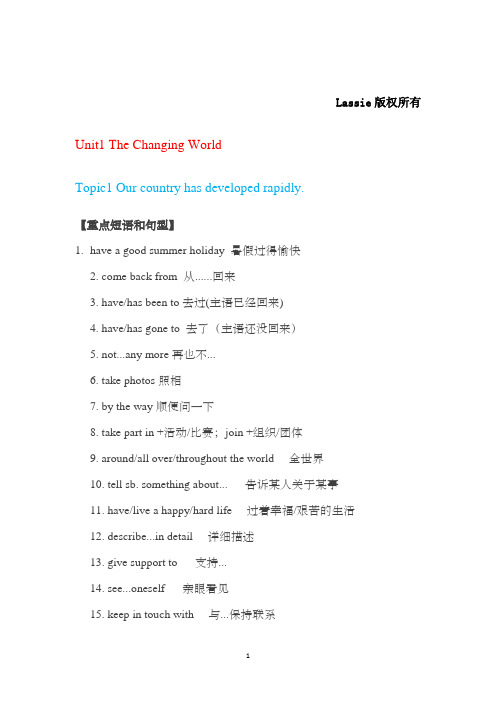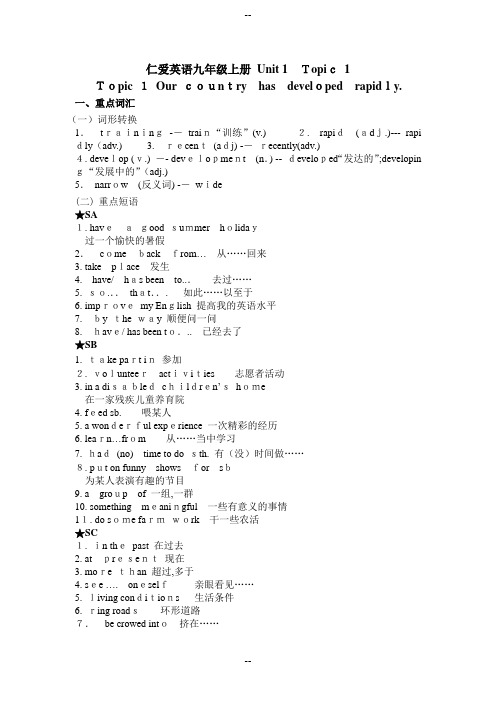仁爱英语新九年级unittopic知识点归纳
仁爱版英语九年级Unit1Topic3知识点

Unit 1 Topic 3(Grade Nine)Ⅰ、词组及用法1、be/get used to sth/doing sth 习惯于…used to do sth 过去常常做…used to be+名/形过去常常是…eg. Tom gets/is used to getting up early.Jane used to go to school by bus.David used to be thin,but now he’s fat.2、as a matter of fact=in fact 事实上3、go to plays 去看表演go to concerts 去听音乐会go to operas 去听歌剧4、come for a visit 来参观5、in need 处在困难时A friend in need is a friend indeed. 患难朋友才是真朋友6、decide on sth 决定,选定某事decide to do sth 决定做…eg. They decide on the best way to learn English.She decided to buy the car at last.7、provide sb with sth=provide sth for sb 提供某人某物/为某人提供某物eg. We provided the hungry children with the food.We provided the food for the hungry children.8、offer sb sth=offer sth to sb(主动)提供某人某物eg. He offered me a cup of tea.He offered a cup of tea to me.9. afford sb sth=afford sth for sb 为某人负担…eg. They afford us food=They afford food for us.10、so that=in order that+从句以便于,为了…eg. They study hard so that/in order that they can find a good job in the future.in order to do sth 为了去做某事eg. He gets up early in order to catch the early bus.11、feel good about…对…感觉好feel good about oneself 自我感觉良好12、pick up 拾起,捡起,(开车)接人eg. Don’t worry. I’ll pick you up at your school gate.13、help sb out 帮助某人摆脱(困境)Peter has some trouble in his Chinese,let’s help him out.14、on purpose 故意地,有意地15、support V.支持,支撑,供养eg. The government in every country has worked for many years to support the homeless.give support(n.)to sb=give sb support 为某人提供帮助eg. We should do our best to give support to the poor children.16、think of…as…=regard…as…把…视为…,把…看成…eg. Our English teacher thinks of us as her friends.18、an education program 一项教育事业19、raise money 筹钱raise one’s hand 举手raise their children 供养孩子20、make a contribution/contributions to sth/doing sth 为…做贡献eg. He made a contribution to Project Hope.I think everyone should make a contribution to protecting the environment.21、as a result 结果22、encourage sb to do sth 鼓励某人去做某事eg. My teacher encouraged me to join the sports club.23、continue(不及物动词)继续,持续Wet weather may continue for a few more days.continue(及物动词)+名/doing…继续…eg. Jim decided to continue his talk to Rose.Lily continued calling her mother up.24、whatever=no matter what 无论什么Whatever you do,you must do your best.25、manage to do sth 设法做成某事eg. They managed to get to the airport in time(及时)26、according to …根据…27、have/has been in …一直在某处eg. He has been in Beijing for three weeks.Ⅱ、语法1、since与forsince+时间点eg. He has worked in the factory since 1998.since+时间段+agoeg. She has been a doctor since two years agosince+一般过去时从句eg. Many things have changed since you left.It’s/has been+时间段+since+从句(过去时)eg. It’s/has been two years since she became a doctor.for+时间段eg. She has stayed in Beijing for three months.2、短暂性动词与持续性动词die——be dead buy——haveleave——be away(from)borrow——keepclose——be closed begin——be onjoin——be a member of …/be in…come to——be in/at…open——be open finish——be overcome——be backeg.①She bought a dictionary three days ago.She has had a dictionary for three days.②They came here yesterday.They have been here since a day ago.③His father joined the Party in 1990.His father has been in the Party since 1990.④I borrowed the book from the library two weeks ago.I have kept the book from the library for two weeks.。
九年级上册仁爱英语知识点总结

Lassie版权所有Unit1 The Changing WorldTopic1 Our country has developed rapidly.【重点短语和句型】1.have a good summer holiday 暑假过得愉快2. come back from 从......回来3. have/has been to 去过(主语已经回来)4. have/has gone to 去了(主语还没回来)5. not...any more 再也不...6. take photos 照相7. by the way 顺便问一下8. take part in +活动/比赛;join +组织/团体9. around/all over/throughout the world 全世界10. tell sb. something about... 告诉某人关于某事11. have/live a happy/hard life 过着幸福/艰苦的生活12. describe...in detail 详细描述13. give support to 支持...14. see...oneself 亲眼看见15. keep in touch with 与...保持联系16. far away 遥远的(常做后置定语)17. kinds/sorts of 各种各样的...18. not only...but also 不仅...而且...19. Make rapid/big progress 取得快速/大的进步20. more than/over 多于21. develop/improve rapidly 迅速发展/改善22. tell sb. (not ) to do sth. 告诉某人(别)做某事23. ask sb. (not ) to do sth. 要求某人(别)做某事24. in order to do sth. 为了做某事25. have to do sth. 不得不做某事26. It's +adj.+for/of sb. to do sth. 对于某人来说做某事怎么样表示事物的性质或特征时用for,表示人的品质或性格时用of。
仁爱英语九年级上册知识点归纳

九年级仁爱版Unit2——Unit4知识点U2 Topic 2 I. 重点词组1. as a result 结果2. here and there 到处3. in the beginning 一开始4. in danger 处于危险中5. cut down 砍倒6. change sth. into sth. 把……变成……7. prevent from 防止8. greenhouse effect 温室效应9. refer to 提到10.deal with 处理11.take up 占据12.cut off 中断II. 重点句型1. As we know, none of us likes pollution. 众所周知,没有人喜欢污染。
none与no one 的区别:a)none “全无”,既可指人也可指物,后常跟of 的短语; 作主语时,谓语动词既可用单数也可用复数;no one只指人,后不能跟of 的短语; 作主语时,谓语动词只用作单数。
如:He has read none of these books.(指物)这些书他一本都没看过。
None of my friends like/ likes drawing.(指人)我的朋友们没有一个喜欢画画。
No one is here.没有一个在这儿。
b)none回答how many/ much的问题;no one回答who的问题。
如:A: How many students come to school by taxi? B: None.有多少的学生搭出租车来上学?没有人。
A: How much water is there in the bottle? B: None.瓶子里有多少水?一点儿也没有。
A: Who is in the room? B: No one.谁在房中?没有人。
2、Trees can also stop the wind blowing the earth away.树木也能防风固土。
仁爱版九年级英语 unit1 topic1知识点

九年级英语上册笔记Unit1 topic1 SectionA1.复习时态1).进行时(2种): be(are/am/is/was/were)+doing sth. 2). 一般将来时:will/shall+do sth. /be going to do sth. (won’t)3).一般现在时:主语+动词(v+s/es)+宾语(don’t/doesn’t)4).一般过去时:主语+动词(v+ed)+宾语(wasn’t/weren’t/didn’t)5).现在完成时:助动词have/has+过去分词(v+ed)(haven’t/hasn’t)定义:表示动作已经完成,对现在产生影响。
没有过去时间,一般与副词already(已经)、ever(曾经)、never (从不)、just(刚刚)、before (以前)、yet(还)、once/twice/three times(一次/两次/三次)、for(为多久)、since(自从)等连用。
2.h ave/has been to…曾经去过,人已回来。
Have/has gone to…人去了,还没回。
3.b e happy to do sth. 开心做某事4.c ome back from…从。
返回5.t ake place 发生6.m ore and more 越来越…(可接名词或多音节形容词)7.s o…that…/such…that…/so that…如此…以至于…/因此注意:so+形容词/副词such+名词短语特殊情况:名词前如果出现many/much/little/few时要用so. Eg: so many people/apples so much food/money8.t ake photos 照相9.i mprove your English 提高英语水平10.by the way 顺便说一下on the way to在…去的路上in the way 挡路out of the way 偏远的11.There goes the bell. 倒装句铃声响了。
仁爱英语九年级上册语法精讲

1.现在完成时的用法:表示过去某一时间发生的动作或存在的状态,对现在仍有影响。
e.g. I have just posted the letter. 我刚把信邮寄了。
She has lost her watch. 她弄丢了手表。
2.现在完成时可以和不明确指出时间的状语连用,如already, yet,just,before, ever, lately, once等。
e.g. Have you heard from your friend lately?你最近收到你朋友的来信了吗?3.现在完成时也可以和包括现在在内的时间状语连用。
如this week, thismorning, today, thisyear等。
e.g. They have moved three times this year. 今年他们已经搬了三次家。
4.现在完成时不能和明确表示过去时间的状语连用。
如yesterday, last week, in 1999, two days ago,just now, when I came in等。
Unit 1-topic3现在完成时(Ⅲ)1.现在完成时表示从过去某一时刻延续到现在的动作或状态,常与for,since引导的状语连用。
for+一段时间,since+过去时间点或从句(从句的谓语动词用过去式)。
e.g. I have lived here for twenty years.我住在这里已有20年了。
We have built many factories since 1985.自1985年以来,我们建了许多工厂。
He has always helped me with my English since he came here.自从他到这里以后,他总是帮助我学习英语。
2.有的动词所表示的动作不是瞬间就可以完成的,要持续一段时间,这样的动词叫延续性动词。
不能延续下去的动词,叫非延续性动词或瞬间动词。
最新仁爱版英语九年级上册Unit1 Topic1知识点 完整版

Unit1 Topic1 SectionA1.高兴做某事be happy/glad to do sth.2.现在完成时:①定义:强调已经发生或完成的动作对现在造成的影响或结果。
②构成:助动词have/has+动词的过去分词③八大时态:三“一”:一般现在时,一般过去时,一般将来时两“现”:现在进行时,现在完成时三“过”:过去进行时,过去完成时,过去将来时3.回来come back=be back=return4.发生:take place (有计划地发生)happen(偶然发生)①What happened to you?②happen to do sth.碰巧做某事(注意:发生没有被动语态)5.越来越美more and more beautiful越来越热hotter and hotter6.去过某地(已回来)have/has been to···去了某地(没回来,强调不在说话现场)have/has gone to···7.如此······以致于①so+形容词+that结果状语从句②such+名词+that结果状语从句(注意:当句中有many,much,few,little表示数量时,均用so)8.拍照take photos=take pictures9.顺便问一下by the way在去······的路上on the way to···挡道,妨碍in the way用这方式in this way10.铃响了. There goes the bell.=That’s the bell.=The bell is ringing.11.来come--came--come 变成become--became--become去go--went--gone 带走take--took--taken是be--was/were--beenUnit1 Topic1 SectionB1.现在完成时句式变化:肯定句:He has cleaned the room.否定句:He hasn’t cleaned the room.一般疑问句:Has he cleaned the room?肯定、否定回答:Yes,he has. / No,he hasn’t.特殊疑问句:What has he done?2.参加,加入①take part in=join in=be in(后跟活动)②join后跟组织,join sb.3.以···为食feed on=live on喂养feed---食物food流血bleed---血液blood4.看见see--saw--seen 喂养feed--fed--fed学习learn--learned/ learnt--learned/ learnt制作;使make--made--made拥有;吃;喝have--had--had感觉feel--felt--felt 放置put--put--put做,干do--did--done 飞,放飞fly--flew--flown阅读read--read--read 遇见meet--met--met5.experience①经历:可数名词②经验:不可数名词experienced为形容词“有经验的”6.感叹句有三种:①What+名词②How+形/副③How+句子How time flies!(注意:“时间,风,雨,雪,三餐,人口,成功”等虽然是不可数名词,但若前面有形容词修饰时,必须用a/an)7.使役动词make的用法:①make sb.+形容词②make sb.+职务名词(职务名词前不能加a/an/the)③make sb. do sth.8.别的,其他的other+复数名词=others9.任何别的any other+单数名词(同一范围内比较)10.虽然though不能与but连用,因为because不能与so连用.11.没有时间做某事have no time to do sth.no=not a / not any12.交朋友make friends with13.put on 穿上;上演;增加(体重)14.①动名词做主语,谓语动词用单三②动词不定式做主语,谓语动词用单三③不可数名词/单数名词做主语,谓语动词用单三④特殊疑问词做主语,谓语动词用单三⑤不定代词做主语,谓语动词用单三⑥one of +the+形容词最高级+复数名词,谓语动词用单三⑦主语从句做主语,谓语动词用单三Unit1 Topic1 SectionC1.在过去in the past 目前,现在at present2.采访;面试interview采访者;面试者interviewer 被采访者;被面试者interviewee3.超过,多于more than=over4.亲眼所见see sth. oneself=see sth. with one’s own eyes=5.在20世纪60年代:in the 1960s在1960年:in 19606.挤进···be crowded intocrowd(动词:挤名词:人群,观众)crowded:形容词7.足够的enough ①enough+名词②形/副+enoughHe is old enough to make enough money.他足够大能挣足够的钱了。
仁爱英语九年级-Unit1-topic1知识点归纳

仁爱英语九年级上册Unit 1Topic1Topic 1Our country has developed rapidly. 一、重点词汇(一)词形转换1.training--train“训练”(v.)2.rapid(adj.)--- rapi dly(adv.) 3.recent(adj) --recently(adv.)4. develop (v.) -- development(n.) -- developed“发达的”;developin g“发展中的”(adj.)5.narrow(反义词) --wide(二)重点短语★SA1. haveagood summer holiday过一个愉快的暑假2.comebackfrom…从……回来3. take place发生4.have/has been to...去过……5. so...that... 如此……以至于6. improvemy English 提高我的英语水平7.by the way 顺便问一问8.have/ has been to... 已经去了★SB1. take part in参加2. volunteeractivities 志愿者活动3. in a disabledchildren’shome在一家残疾儿童养育院4. feed sb. 喂某人5. a wonderful experience 一次精彩的经历6. learn…from从……当中学习7. had(no)time to do sth. 有(没)时间做……8. put on funny showsfor sb为某人表演有趣的节目9. a group of 一组,一群10. something meaningful一些有意义的事情11. do some farmwork 干一些农活★SC1. in thepast 在过去2. atpresent现在3. more than 超过,多于4. see ….oneself亲眼看见……5. living conditions 生活条件6. ring roads环形道路7.be crowed into挤在……8. have the chanceto do sth. 有机会做某事9. receive agood education接受良好的教育10. keep in touch with sb byletter ortelegram通过书信或电报与某人取得联系11. far away遥远12.the reformand opening-up 改革开放13.tallerandbrighter 又高又明亮14. satisfy one’s needs 满足某人的需要15.not only…but also…不但……而且……16. enjoygoodmedical care享受很好的医疗保健17.what’s more 而且18. make rapid progress取得很大/快速进步19.succeedin doing sth成功地做某事20. rememberthe past 记住过去21. livein the present 立足现在22.dream about the future展望未来23. the course of……的过程★SD1. leisure activities休闲活动2.play an important part in在……中发挥重要作用3. playhide-and-seek捉迷藏4.play chess下棋5.in one'sspare/free time在某人空闲时6. spend ... on sth. 花费……在……上7. various kinds of各种各样8. both... and...不仅……而且……9. places of interest名胜古迹10.in theopen air 在户外二、重点句型。
仁爱版九年级上册unittopic知识点

Unit1TheChangingWorldTopic1Myhometownhasbecome moreandmorebeautiful1aLook,listenandsay(Afteralongholiday,Kangkang ishappytosee hisfriends.)Kangkang:Hi,Jane.Didyouhaveagoodsummerholiday?Jane:Yes.Whataboutyou?Kangkang:Notbad.Rita,you havejustcomeback fromyourhometown.Howwasyourtrip? Rita:Great.IwenttomanyplacesnearmyhomeinIndia.Greatchangeshavetakenplace thereandmyhometownhasbecomemoreandmorebeautiful.Wherehaveyoubeen,Jane?Jane:IhavebeentoMountHuangwithmyparents.It’sabeautifulplace.Buttherewere so manypeople that Icouldn’tfindaproperplacetotakephotos.And wherehaveyoubeen,Kangkang?Kangkang:Ihavebeento anEnglishsummerschooltoimprovemyEnglish.Bytheway,whe re’sMaria?Jane:shehasgonetoCuba tobeavolunteer andshewillbebacktomorrow.Rita:Listen!Theregoesthebell.语法点:1.现在完成时的基本用法:主语+have+过去分词现在完成时跨在两个时间之上,一是过去,一是现在。
- 1、下载文档前请自行甄别文档内容的完整性,平台不提供额外的编辑、内容补充、找答案等附加服务。
- 2、"仅部分预览"的文档,不可在线预览部分如存在完整性等问题,可反馈申请退款(可完整预览的文档不适用该条件!)。
- 3、如文档侵犯您的权益,请联系客服反馈,我们会尽快为您处理(人工客服工作时间:9:00-18:30)。
仁爱英语新九年级u n i t t o p i c知识点归纳集团公司文件内部编码:(TTT-UUTT-MMYB-URTTY-ITTLTY-G9U n i t1T o p i c1Topic1Ourcountryhasdevelopedrapidly.一、重点词汇(一)词形转换1.training--train“训练”(v.)2.rapid(adj.)---rapidly(adv.)3.recent(adj)--recently(adv.)4.develop(v.)--development(n.)--developed“发达的”;developing“发展中的”(adj.)5.narrow(反义词)--wide(二)重点短语★SA1.haveagoodsummerholiday过一个愉快的暑假ebackfrom…从……回来3.takeplace发生4.have/hasbeento...去过……5.so...that...如此……以至于6.improvemyEnglish提高我的英语水平7.bytheway顺便问一问8.have/hasbeento...已经去了★SB1.takepartin参加2.volunteeractivities志愿者活动3.inadisabledchildren’shome在一家残疾儿童养育院4.feedsb.喂某人5.awonderfulexperience一次精彩的经历6.learn…from从……当中学习7.had(no)timetodosth.有(没)时间做……8.putonfunnyshowsforsb为某人表演有趣的节目9.agroupof一组,一群10.somethingmeaningful一些有意义的事情11.dosomefarmwork干一些农活★SC1.inthepast在过去2.atpresent现在3.morethan超过,多于4.see….oneself亲眼看见……5.livingconditions生活条件6.ringroads环形道路7.becrowedinto挤在……8.havethechancetodosth.有机会做某事9.receiveagoodeducation接受良好的教育10.keepintouchwithsbbyletterorteleg ram通过书信或电报与某人取得联系11.faraway遥远12.thereformandopening-up改革开放13.tallerandbrighter又高又明亮14.satisfyone’sneeds满足某人的需要15.notonly…butalso…不但……而且……16.enjoygoodmedicalcare享受很好的医疗保健17.what’smore而且18.makerapidprogress取得很大/快速进步19.succeedindoingsth成功地做某事20.rememberthepast记住过去21.liveinthepresent立足现在22.dreamaboutthefuture展望未来23.thecourseof……的过程★SD1.leisureactivities休闲活动2.playanimportantpartin在……中发挥重要作用3.playhide-and-seek捉迷藏4.playchess下棋5.inone'sspare/freetime在某人空闲时6.spend...onsth.花费……在……上7.variouskindsof各种各样8.both...and...不仅……而且……9.placesofinterest名胜古迹10.intheopenair在户外二、重点句型。
1.You havejustcome backfromyourhometown.你刚刚从你的家乡返回。
2.There goesthebell.=Thebellisringing.铃响了。
3.Though Ihadnotimetotravel,Istillfeltveryhappy.thoughconj.尽管,虽然,引导让步状语从句。
注意:though不能与but连用。
类似用法的词还有although,evenif,eventhoughe.g.Thoughitwaslate,hewentonworking.4.Whatawonderfulexperience!多精彩的一次经历啊!感叹句:一般是用来表示说话时的喜悦、惊讶等情感。
一、"what"意为"多么"用作定语,修饰名词(被强调部分),单数可数名词前要加不定冠词a/an,复数可数名词或不可数名词前不用冠词。
这类句子的结构形式是:What+(a/an)+形容词+名词+主语+谓语!(①What+a/an+形容词+可数名词单数+主语+谓语!②What+形容词+可数名词复数+主语+谓语!③What+形容词+不可数名词+主语+谓语!)e.g.Whataninterestingstoryitis!多么有趣的故事呀!Whatgoodchildrentheyare!他们是多么好的孩子呀!Whatheavysnowitis!多么大的雪呀!由"how"引导的感叹句:"how"意为"多么",用作状语,修饰形容词或副词(被强调部分)。
如果修饰形容词,则句中的谓语动词用系动词;如果how修饰副词,则句中的谓语动词用行为动词,这类句子的结构形式是:How+形容词/副词+主语+谓语!(①How+形容词/副词+主语+谓语!②How+形容词+a/an+可数名词单数+主语+谓语!③How+主语+谓语!)e.g.Hownicethepicturesare!多么漂亮的图画呀!Howwellshesings!她唱得多好呀!Howhardtheyareworkingnow!他们干得多么起劲呀!Howtimeflies!光阴似箭!Ex.excitingnewsyou'vebroughtus!deliciousthesoupis!I'dlikesomemore.dictionaryitis!(useful)thestudentsarelistening!(carefully)5.People keptintouchwith theirfriendsandrelatives faraway mainlybyletterortel egram.人们主要靠信件或电报与远方的亲友和家人保持联系。
keepintouchwith…与……保持联系e.g.Hestillkeepsintouchwithhisoldfriends.拓展:getintouchwith…与……联系losetouchwith…和…失去联系faraway遥远,常放在句末作后置定语。
e.g.Theyliveinavillagefaraway.faraway遥远的e.g.afarawaytown一个遥远的小镇farawayfrom+某地离……遥远。
如果前面有具体数字时,则不能连用far。
e.g.MyhometownisfarawayfromBeijing.Myhometownisabout100kilometersawayfromShanghai.6.Shehas seen thechangesinBeijing herself.她亲眼目睹了北京的变化。
7.Ithinkitisimportantto rememberthepast,liveinthepresentanddreamabout thefuture.我认为牢记过去、立足现在、展望未来非常重要。
8.China hasdeveloped rapidly since thereformandopening-up.自改革开放以来,中国发展迅速。
9.Beijinghas maderapidprogress.北京已经取得迅速的进步。
progress为不可数名词makeprogress取得进步makesome/much/greatprogress取得一些/许多/巨大的进步三、重点语法---现在完成时构成:助动词have/has+过去分词1.肯定句现在完成时的肯定句式是“have(has)+过去分词”。
注意:该句式中的have或has是助动词,has用于第三人称单数,其它人称一律用have。
eg.Hehaseatensupper.Theyhaveeatensupper.2.疑问句现在完成时的一般疑问句式是把助动词have或has提到主语之前。
(回答用“Yes,---have/has./“No,---haven’t/hasn’t.”)eg.Hasheeatensupper?Yes,hehas./No,hehasn’t.3.否定句:现在完成时的否定句式是“haven't/hasn't+过去分词”。
eg.Hehasn’teatensupper.Theyhaven’teatensupper.注意:1.have/hasbeento与have/hasgoneto的区别用havebeento与havegoneto的适当形式填空1.HeXiamentwice.2.WhereisKangkang?Hethelibrary.3.youeverDalian?No,never.4.Mr.Whiteisn’tathome.Hethebookstore.5.MayIspeaktoKate?Sorry,shethemuseum.6.yourfathereverAmerica?No,heneverthere. ButheEnglandseveraltimes.2.since+时间点=for+时间段since2000=for7years用for和since填空1.TheyhavebeenlearningChinese_______theycametoChina.2.Ihaven’tseenher_______alongtime.3.Hehasbeenlivinghere_______2001.4.Shehasbeendoingherhomework________twohours.5.It’s5years_______weleftschool.6.–HowlonghasMarybeenateacher?–_______twoyearsago.7.填上适合的词。
